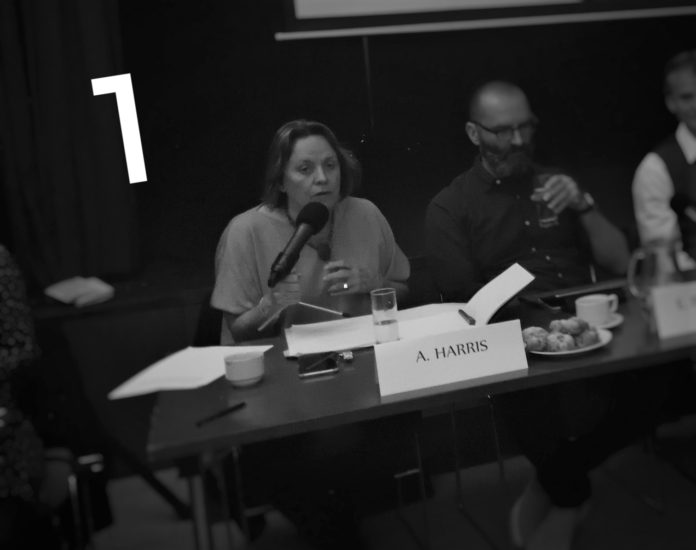Adrienne Harris is one of the leading personalities of Relational psychoanalysis. Among other things, she is an Associate Editor of Psychoanalytic Dialogues journal and edits the Stephen Mitchell Relational Book Series (which has published over 35 books in its series). Her professional interests are the analytic subjectivity and relation between psychoanalysis and gender, and development. This interview took place in Prague during the „2nd Fenichel’s conference: Psychic change“ in October 2017.
Jakub Kuchař: Thank you very much for your time, Dr. Harris. I’ll ask you a few questions about psychoanalysis and politics. My first question is “Can psychoanalysis and psychoanalysts influence sociopolitical situation, and if so, in which concrete ways?”
Adrienne Harris: It’s a hard question to answer but it’s an important question to be asked, which is, how would somebody who’s identified and practices as a psychoanalyst also be a political activist and try to be influential?
I think there’s actually a whole range of issues. One is that, I think, you have to write and speak outside of just the narrow confines of your discipline. So, in America or North America, the term would be, how do you become a public intellectual? How do you speak and how do you find an access to communication in which you talk about what you understand as a psychoanalyst and how it impacts on how psychoanalytic ideas help you understand current political life. How in America do we understand racism, for example? How do we understand the election that just happened in which, hatred of minorities and hatred of black people was an incredibly powerful force which remained sort of unobserved in the larger public and certainly in the more intellectual parts of American life.
I think people were unprepared for the fact how deep the racial hatreds are and were. And so the job of a psychoanalyst trying to intervene or have an effect on debates around race would be to try and think about why were we (we being liberals or middle class or educated middle class or the intelligencia) so blind to how serious racism is in America? How do we not understand how still unprocessed racial hatred and phobic hatreds are? So I think finding a venue, finding a space, getting psychoanalysts to enter more public arenas like newspapers and online blogs, The Huffington Post, The New York Times, and try to say what psychoanalytic ideas, what ideas about fear and primitive anxieties and the collapse of memory are. How might we, as psychoanalysts, talk about what happens when people become so frightened that they actually do very dangerous and destructive things, both collectively and individually.
I also think that that one thing that psychoanalysts can do is something that any citizen can do, which is to protest. And there’s quite a lot of interesting research that suggests that non-violent protest is a very effective form of political action. So a psychoanalyst can be an activist in even the most basic way, through protest, through continuing to push back against forces of right wing ideology, fascism, racism. So in some ways psychoanalysts can be political the way anybody can, through activism.
And do you think that it’s possible to reconcile these public activities with the classic psychoanalytic notion of neutrality and anonymity?
Well, that classic notion of anonymity and neutrality has been enormously excavated and thought about in recent years. I think to be anonymous and neutral really are unreal expectations of how a psychoanalytic process works. There are two people in the room. There are roles. There’s a frame. There is a setting. There are all kinds of procedures. But within it, there are two people, each one with an unconscious. And so, how these unconsciouses are interwoven is very complicated. I doubt that neutrality is very often what one feels doing clinical work. You are trying to be reflective. So what you can and must be is to be reflective, thoughtful. It doesn’t mean you act out as an analyst. It doesn’t mean that you tell your patients everything about yourself. But it’s unlikely that you’re exactly anonymous. After all, your office is somewhere, in some city. And that office is likely to be already signified by class, by neighborhood, how it’s furnished. So the materiality of the office already undermines anonymity and neutrality. In this way I’m a Ferenczian and Ferenczi talked about psychoanalysis as the dialogue of two unconciousnesses. The analyst is there to frame and be responsible for the setting and to listen. But listening is unlikely to be neutral in the sense of indifferent. So that you can be a very careful analyst, you can be thoughtful, you can try to give the patient endless space to talk and to manifest things. You can do the work of analysis. But I don’t think that anonymity and neutrality are very adequate descriptions of the complexity of the analytic process. So it’s not that you proselytize and do your politics in the clinical situation. But it’s unlikely that your politics is completely absent from the situation. It is unlikely that analyst would be neutral in the sense that they would think nothing about issues like gender.
Psychoanalysts have feelings about gender and sexuality, different forms of sexuality etc. So we have to figure out a better word than “neutrality” for creating an atmosphere in which it can be possible to think things that are usually unthinkable. Whether they’re about identity or about political life or about meaning or about cruelty. So, I think the task of the analyst is to create an environment in which things that are often unspeakable and unthinkable can be thought and spoken. So you have to create freedom in the room. If you’re too invasive as the analyst, you will spoil it. If you’re too far away, you may not be able to produce an atmosphere in which the patient feels safe. So, I would guess for me a more important word than “neutrality” and “anonymity” would be “safety”. Not too safe because both the analyst and the patient have to be able to be free to say things that are dangerous. But the analyst’s job is to be responsible for this setting and to create conditions of safety. I think it’s true that analysts are turning to the political sphere and attempting to create an analysis in which it might be safe to think about what is happening in the world. As well as what is happening in a clinical situation, in the patient’s mind or life. Even though being an analyst and being an activist are two different practices, there are still practices of one and the same person.
My other question is whether you see parallels between psychic change and changes in society? Could we apply the logic linked with changes in the individual to changes in the society?
It’s a good question and to me it’s a question of what are the different theoretical structures that would be useful, to think about the individuals’ change and to think about changes in the society. And I think that at this conference, for example, people were moving through different disciplines. Through psychology. Through the study of early development. Through social analysis. Through political theory. And so, I think this is very much at the heart of Freud’s model, which was an interdisciplinary model. So you can’t just take the psychoanalytic individual and export it to the social. I think we have to think what happens in groups. Then, what differes a group from an individual. What is a difference between an individual and a family structure. What is a difference between a dyad and an individual. And for this, you really need to be thinking across different disciplines. So one of the things that David Bell said at our panel on the whole question of political and social and individual, was similar to what the Frankfurt school or Adorno said in philosophy. That you can’t bring psychoanalysis into the social and political without becoming interdisciplinary. Deleuze has thought about concepts as the nomadic. He wanted us to think of concepts from different disciplines as sources of energy not bits of propert yThat is, they travel. They’re sources of energy. So they don’t just belong to one discipline or just to one part of psychoanalysis. So, for example, phobic hatred is a psychoanalytic concept, but it can travel into a social analysis. But when you look at the social, you have to think about what happens in large groups. Vamik Volkan’s work is focused on this. He calls it the “big tent”: what occurs when people join a group and submerge their ideology and their being into the group, you can’t just have an individual theory of individual development. You have to be willing to look at how disciplines – sociology, anthropology, developmental psychology, psychoanalysis, history, political theory – are interconnected. You have to be in an interdisciplinary matrix if you’re going to be able to be useful. I think whether you’re doing individual work as a psychoanalyst or social-political work as an activist, you have to think across disciplines. The whole of psychoanalysis was transformed by changes in the study of infancy. So developmental psychology and the study of the infant transformed how we think as analysts. That is an interdisciplinary conversation.
Yes, but isn’t there a danger of oversimplifying and losing many details connected to the particular disciplines and theories?
Yes, there is always a danger in trying to take something that comes out of a practice like a psychoanalysis and extrapolating it to the social. That would always be a simplification. But I think the interdisciplinary work has the possibility of working against simplification. Because you can’t think just of the individual or the dyad, you have to think of the larger collective. For example, at this conference, Joe Dodds talked about the environment and climate change, and it is very true that we need to think about the danger to the environment in connection to collective and indiviidual anxieties. Fenichel talked about that back in the thirties or the twenties. So, I actually think that having an interdisciplinary perspective has the possibility of working against simplification.
Needless to say it’s also a simplification when someone claims that interdisciplinary means oversimplification.
Yes! It is hard work, to think outside of the individual, into the social. But it is not impossible work. It’s also hard and useful work to extrapolate from the social background to the individual. I mean, a lot of our psychoanalytic theories, contemporary theories about gender and sexuality have been enormously influenced by social phenomena and movements and groups.
Speaking of this topic, what do you think of neuropsychoanalysis? It is very popular these days.
I’m a fan but I know that there are certainly people in psychoanalysis who are against this approach. Rachel Blass, a British Kleininan, thinks that you should not even read neuroscience because it will only take you away from thinking about the mind, about speech, about discourse and about meaning. When I speak about the importance of interdisciplinary work, I actually feel I’m being very Freudian. I feel that I’m in the lineage of Freud himself, who was thinking across different disciplines and was interdisciplinary. So I can’t imagine not wanting to read neuroscience or think about it. We are material creatures. We have biologies, we have brains. There’s a tremendous danger of oversimplification of the psychological into the biological and vice versa. So, it’s not as that there would be dangers of going too quickly from the physiological to the psychological. For example, the study of mirror neurons is probably one of those things which people took it as a phenomena in physiology and psychologised it so quickly that it was somehow explaining everything. Therefore I think that you have to be careful. It’s just one of the many discourses, but I can’t imagine not reading neuroscience and thinking what does it tell us about the memory, how memory is always transformed in the process of remembering and forgetting in a certain way. To think about the ways in which body and mind are interwoven. How you live in your body has implications for how you see and process information. So I can’t imagine not having neuroscience in the discourse. It would feel anti-intellectual to say “no, we’re never going to read any of this because it has nothing to do with psychoanalysis”. Again, the study of infancy is dependent on understanding a huge amount about infant cognition, infant perception. You couldn’t really understand infancy without understanding something about the infant’s way. And its capacities. And its limits. And its potentialities.
Adrienne Harris, Ph.D. is Faculty and Supervisor at New York University Postdoctoral Program in Psychotherapy and Psychoanalysis. She is on the faculty and is a supervisor at the Psychoanalytic Institute of Northern California. In 2009, She, Lewis Aron, and Jeremy Safron established the Sandor Ferenczi Center at the New School University. She writes about gender and development, about analytic subjectivity, about ghosts, and about the analysts developing and writing around the period of the First World War.
Here you can read the second part of the interview (focused on the future of psychoanalysis, ways how to communicate psychoanalytic ideas and Otto Fenichel’s comming to the US).




